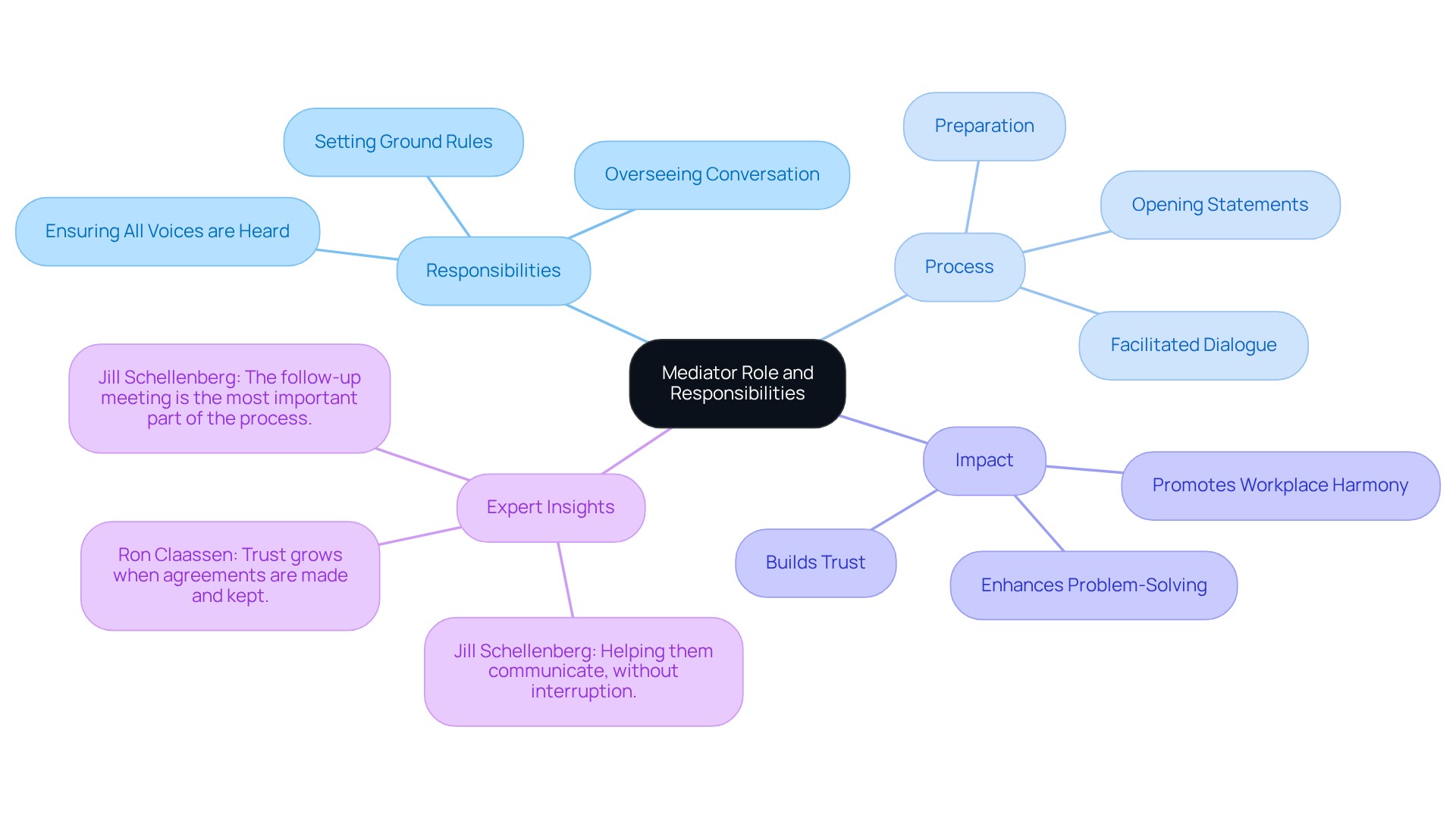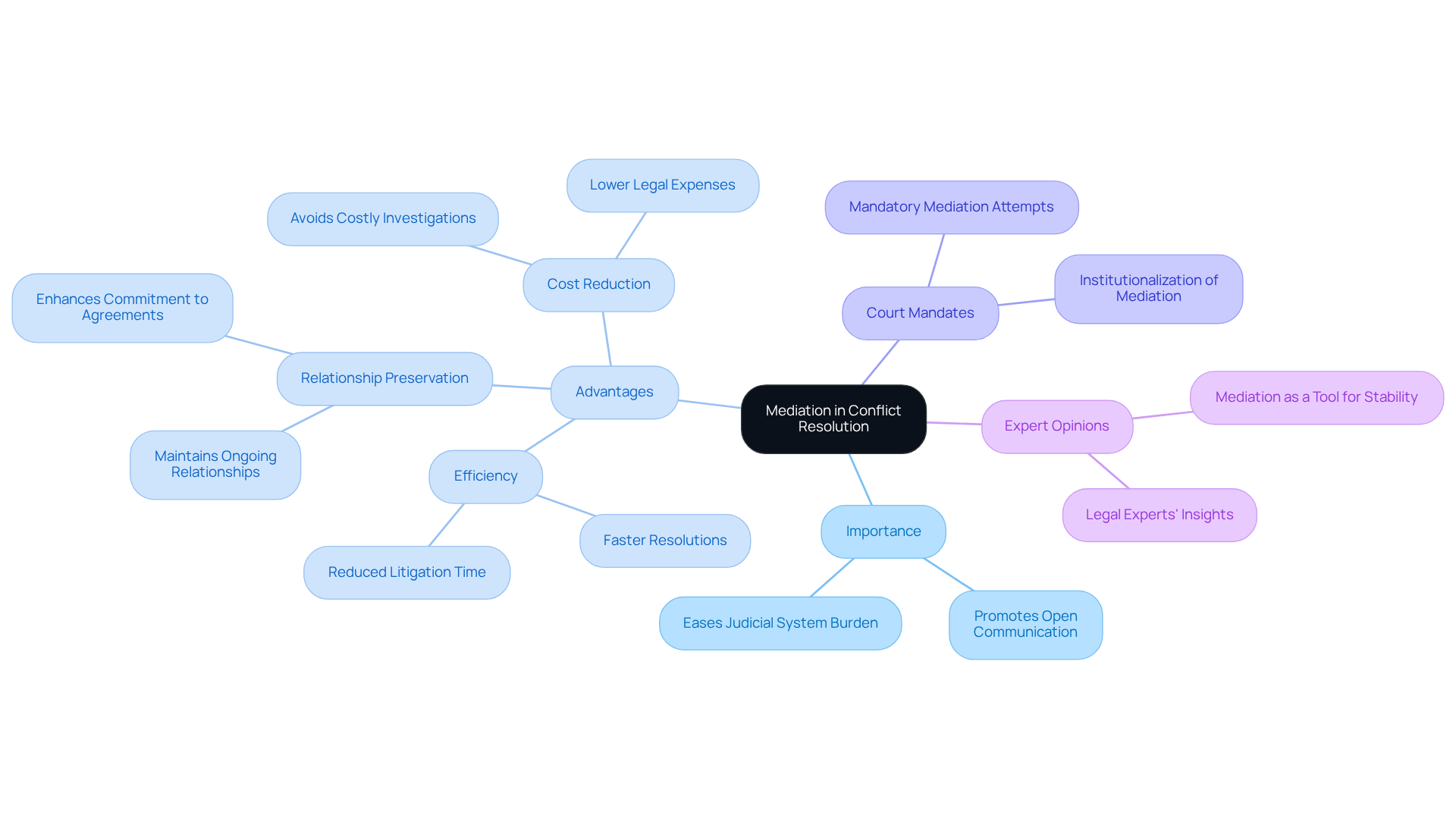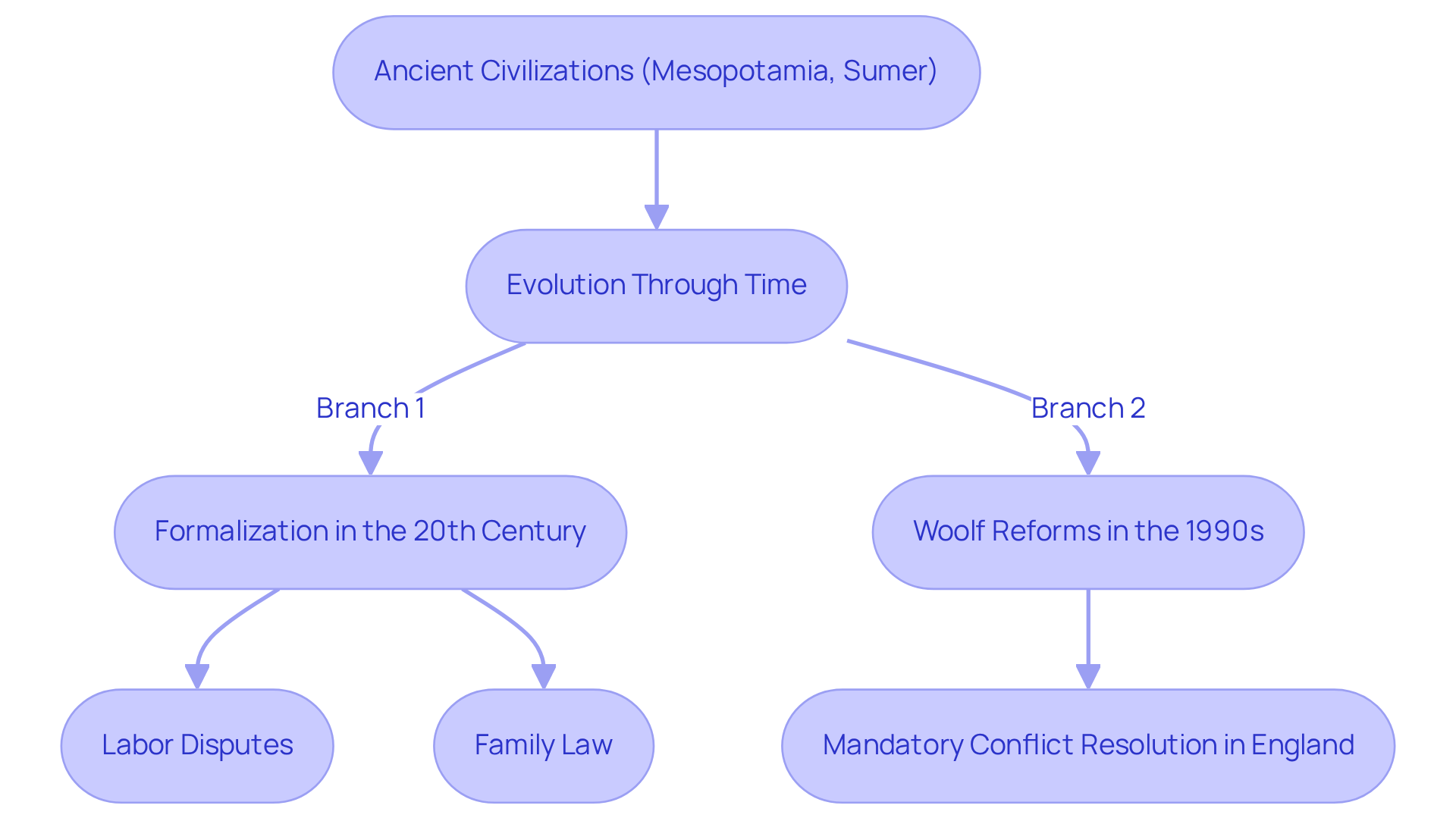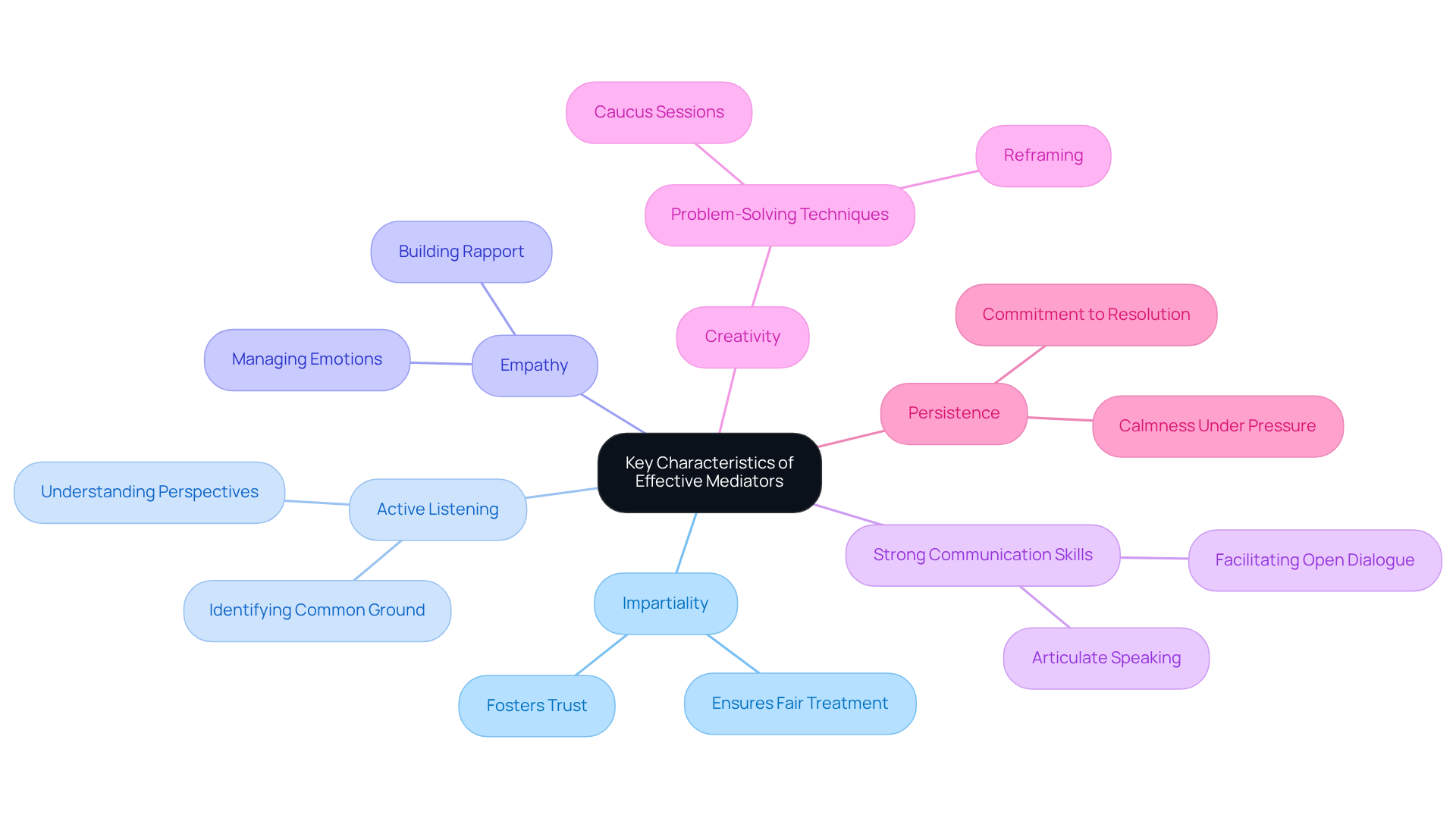
Understanding the Meaning of Mediator in Conflict Resolution
Overview
This article delves into the vital role of mediators in conflict resolution, highlighting their importance as impartial facilitators who assist parties in communicating and finding mutually satisfying solutions. Have you ever found yourself in a disagreement, wishing for someone to help bridge the gap? Mediators step in to provide that support, guiding conversations toward understanding and collaboration.
The responsibilities of a mediator are significant. They not only facilitate discussions but also ensure that each party feels heard and valued. The historical evolution of mediation showcases its advantages over litigation, which can often be adversarial and draining. Imagine a process that promotes harmony rather than hostility—this is what mediation offers.
Effective mediation requires essential skills, such as active listening and empathy. These skills are crucial in fostering an environment where all parties can express their concerns openly. By nurturing this understanding, mediators play a pivotal role in transforming conflicts into opportunities for growth.
In conclusion, embracing mediation can lead to more positive outcomes in conflict situations. If you find yourself facing a dispute, consider reaching out to a mediator. Together, we can navigate through challenges and foster a collaborative spirit that benefits everyone involved.
Introduction
Understanding the role of a mediator in conflict resolution reveals a vital component of effective communication and collaboration. As compassionate third parties, mediators facilitate discussions, helping conflicting parties explore their needs and work towards mutually beneficial solutions.
But what challenges do mediators face in fostering trust and ensuring that all voices are heard? This is a crucial question that many may ponder.
This exploration delves into the intricacies of mediation, offering insights into its significance and the essential qualities that define successful mediators. Together, we can appreciate the transformative power of mediation and the nurturing support it provides to those in conflict.
Define Mediator: Role and Responsibilities
An intermediary exemplifies the meaning of mediator as a compassionate third party who facilitates conversations between conflicting groups, helping them find a solution that works for everyone. Unlike judges or arbitrators, facilitators do not impose decisions; they guide the dialogue, encourage open communication, and assist individuals in identifying their needs and interests. The facilitator's responsibilities include:
- Setting the ground rules for the conflict resolution process
- Overseeing the conversation
- Ensuring that all voices are heard
This role is vital in fostering a safe environment where parties can work together towards a satisfying resolution, reflecting the meaning of mediator.
Consider the positive impact of successful mediation case studies, particularly those that highlight the benefits of workplace mediation. These structured approaches—featuring preparation, opening statements, and facilitated dialogue—not only address immediate disputes but also promote proactive problem-solving and enhance overall workplace harmony.
Insights from experts in the field underscore the importance of understanding the meaning of mediator. As one expert notes, 'Assisting them in communicating, without interruption, summarizing ideas, and developing feasible solutions is the responsibility of the facilitator.' Additionally, Ron Claassen emphasizes that 'Trust increases when agreements are established and upheld,' reinforcing the facilitator's role in nurturing lasting solutions. By prioritizing open communication and understanding, facilitators empower participants to take control of their resolution process, leading to more satisfying outcomes.
Moreover, follow-up meetings after the intervention are crucial, as they help ensure that agreements are honored and any lingering issues are addressed. This ongoing support strengthens the mediator's influence throughout the settlement process. How can we foster this environment of trust and collaboration in our own interactions? Let's embrace the role of facilitators in our lives, nurturing understanding and connection.

Context of Mediation: Importance in Conflict Resolution
Mediation serves as a crucial mechanism in conflict resolution, illustrating the meaning of mediator by offering a structured yet adaptable process that promotes collaboration and open communication. In a time when rapid and affordable solutions are essential, conflict resolution stands out as a favored option to conventional litigation, which is frequently marked by its confrontational nature and protracted processes. Have you ever felt overwhelmed by the complexities of legal disputes? Statistics indicate that more than 60% of litigated cases in California now pursue alternative dispute resolution, highlighting its increasing significance in easing the strain on an already congested judicial system. Significantly, some courts mandate negotiation attempts before permitting cases to advance to trial, further institutionalizing the process's role in the legal landscape.
The advantages of negotiation reach further than simple efficiency; it promotes a collaborative atmosphere that not only enables agreements but also aids in maintaining relationships among involved individuals. This aspect is particularly valuable in both personal disputes and professional settings, where maintaining ongoing relationships can be critical. Imagine resolving a conflict while still preserving a valuable relationship. Successful negotiation results often lead to more satisfactory outcomes, as parties feel heard and involved in the process, enhancing their commitment to the agreed-upon terms.
Expert opinions further reinforce the benefits of negotiation. Legal experts stress that alternative dispute resolution can greatly lessen litigation expenses and duration, facilitating faster conclusions that advantage everyone involved. As mentioned by Mona R. Shah, "some courts now mandate at least one effort by the parties to pursue negotiation or some type of alternative conflict management before they can be permitted to utilize the resources of an already overwhelmed judicial system." By prioritizing communication and understanding, this process not only resolves disputes but also reinforces the foundations of future interactions, illustrating the meaning of mediator as an essential tool in today’s conflict resolution landscape.
Furthermore, Conclude ADR provides adaptable scheduling choices and value-driven pricing, guaranteeing that conflict resolution services are available and affordable for clients. We are here to support you through this journey, ensuring that you have access to the resources you need for a peaceful resolution.

Historical Evolution of Mediation: A Journey Through Time
Conflict resolution has a rich history that many may not realize, with its roots stretching back to ancient civilizations like Mesopotamia and Greece. In fact, it can be traced back to the Sumer civilization, which emerged between the sixth and fifth millennium B.C. Imagine respected community leaders or elders facilitating discussions between disputing parties, prioritizing conciliation over confrontation. This nurturing approach laid the groundwork for how we handle conflicts today.
As societies evolved, so did the practice of conflict resolution. In the 20th century, it became more formalized, particularly in response to labor disputes and family law matters. The Woolf reforms in England during the 1990s brought alternative dispute resolution into the spotlight, addressing the significant challenges of cost, delay, and complexity in civil justice. Today, did you know that mandatory conflict resolution applies to disputes valued up to GBP 10,000 in England and Wales? This reflects a contemporary legal context that supports the practice's use.
This evolution highlights a growing societal recognition of collaborative conflict management approaches. These strategies, which are informal and non-binding, illustrate the meaning of mediator by encouraging cooperative problem-solving and self-determination among the involved parties. Additionally, as court dockets become increasingly congested, understanding the meaning of mediator emerges as a more attractive option for resolving conflicts. This shift solidifies mediation's role as a legitimate and effective alternative to litigation.
In summary, embracing these practices not only fosters understanding but also paves the way for healthier resolutions. Let us consider how we can support one another in navigating conflicts with compassion and cooperation.

Key Characteristics of Effective Mediators: Skills and Qualities
Effective facilitators possess a unique blend of skills and qualities that enable them to achieve successful resolutions. Have you ever wondered what makes a facilitator truly effective? Key characteristics include:
- Impartiality
- Active listening
- Empathy
- Strong communication skills
A competent facilitator must stay impartial, ensuring that all individuals feel acknowledged and valued. They should also be adept at managing emotions and navigating complex interpersonal dynamics, particularly in high-pressure situations where emotional intelligence is crucial.
Creativity and problem-solving abilities are essential. Facilitators often need to assist parties in generating innovative solutions that meet their underlying interests. Skilled facilitators employ various techniques, including caucus sessions and reframing, to guide discussions effectively. For instance, in a challenging negotiation situation, a facilitator's dedication and ingenuity led to an agreement after three days of intensive discussion. This illustrates that effective facilitators do not give up.
Moreover, proficient facilitators understand the subtleties of human behavior, which can significantly affect the negotiation process. By facilitating open dialogue and mutual understanding, they enhance the likelihood of a satisfactory outcome. It’s important to understand the meaning of mediator, as they do not determine legal matters; rather, they aid in achieving resolutions. This highlights the meaning of mediator as their vital role in the process. The combination of these traits not only fosters trust among disputing parties but also significantly contributes to the overall success of the mediation process.
So, how can we embrace these qualities in our own interactions? By recognizing the importance of empathy and effective communication, we can all play a part in fostering understanding and resolution in our discussions.

Conclusion
The essence of a mediator in conflict resolution lies in their ability to facilitate dialogue and foster understanding between conflicting parties. This compassionate intermediary plays a crucial role, guiding discussions without imposing decisions and creating a safe environment where all voices are heard. By embodying the meaning of mediator, they help individuals identify their needs and interests, ultimately leading to collaborative solutions that benefit everyone involved.
Throughout this exploration of mediation, several key points highlight its significance:
- The historical evolution of conflict resolution practices
- The essential characteristics of effective mediators
It becomes clear that mediation is not just a practical alternative to litigation; it is a vital tool for maintaining relationships and promoting understanding. The structured approach of mediation, combined with the mediator's skills in communication and empathy, enhances the likelihood of satisfactory outcomes, making it an invaluable process in both personal and professional contexts.
Reflecting on the importance of mediation, we can see that embracing the role of facilitators in our daily interactions can lead to healthier resolutions and stronger connections. By prioritizing open communication and understanding, we can navigate conflicts with compassion, ultimately fostering an environment of trust and collaboration. As society continues to recognize the value of mediation, it is essential for us to advocate for and implement these practices. Together, we can ensure that conflict resolution remains constructive and relationship-focused.
Frequently Asked Questions
What is the role of a mediator?
A mediator acts as a compassionate third party who facilitates conversations between conflicting groups, helping them find mutually agreeable solutions without imposing decisions.
What are the main responsibilities of a mediator?
The main responsibilities of a mediator include setting ground rules for the conflict resolution process, overseeing the conversation, and ensuring that all voices are heard.
How does a mediator differ from a judge or arbitrator?
Unlike judges or arbitrators, mediators do not impose decisions; they guide the dialogue and encourage open communication among the parties involved.
What is the significance of successful mediation case studies?
Successful mediation case studies highlight the benefits of workplace mediation, showcasing structured approaches that not only address immediate disputes but also promote proactive problem-solving and enhance overall workplace harmony.
What insights do experts provide regarding the mediator's role?
Experts emphasize that mediators assist participants in communicating effectively, summarizing ideas, and developing feasible solutions. They also highlight that trust increases when agreements are established and upheld.
Why are follow-up meetings important after mediation?
Follow-up meetings are crucial as they help ensure that agreements are honored and any lingering issues are addressed, thereby strengthening the mediator's influence throughout the settlement process.
How can we foster an environment of trust and collaboration in our interactions?
We can foster trust and collaboration by embracing the role of facilitators in our lives, nurturing understanding and connection among individuals.


